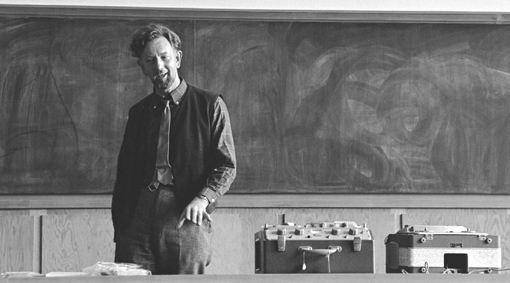Are We Listening?

Radio producer Charles Parker (image: Bournemouth University).
Secondly, there are celebrated radio programmes or broadcasters that students can read about but cannot easily listen to or legally own a copy of. For example, classic BBC radio features such as Olive Shapley’s The Classic Soil (1937) and Louis MacNeice’s The Dark Tower (1946); quotidian output from Radio Caroline in the 1960s; or Independent Local Radio phone-ins from the 1970s. This means that the so-called ‘canon’ of British radio has been shaped by a relatively small published corpus of texts on radio programming, which is ironic given radio’s pre-eminent status as an oral medium! Imagine a student taking a course on 1940s British cinema who could not view The Third Man (1949) or Brief Encounter (1947) in the classroom, in the University Library or in the comfort of her own home, and we begin to get an idea of the problem. The ‘canon’ of radio is, of course, also defined and circumscribed, as I have suggested, by the known (i.e. catalogued and hence visible) archival record.
Teaching about the impact of media on audiences is often best illustrated by a clip of Orson Welles’ legendary War of the Worlds, and teaching radio comedy is facilitated by the widespread circulation of The Goon Show recordings on CD and the availability of scripts in published form. However, those who teach radio production or radio history at degree and post-graduate level are increasingly finding that it is the quotidian, rather than the canonical material, that they desire most. This highlights the wisdom of Asa Brigg’s recommendation (in the 1997 edition of the BUFVC Researcher’s Guide) that, where attempts to preserve everything prove too costly, ‘‘time slices’ of broadcast output can be retained, which may enable people in the distant future to learn far more about ourselves than we have consciously chosen to tell them’.
This reminds us that when we talk of archives we speak of cultural memory. Memory is an active, negotiated process. And like history, as Raphael Samuel reminds us, ‘what it contrives symptomatically to forget is as important as what it remembers’. Memory necessitates ‘selection’; we cannot possibly remember everything, just as it is unrealistic to aspire to archive and preserve all broadcast output in its entirety. So selection remains a crucial issue – and one in which radio scholars should play a key role. Exponential advances in technology and digital storage promise a radical expansion and promotion of the availability of cultural memory. On 1 November Mark Thompson, the then BBC Director General, raised the tantalising prospect in a speech to the 2011 Radio Festival in Salford of,
… a world in which all the content the BBC created was available online and, critically, linked to and shared with numerous partners … a sort of ‘Audiopedia’ that would give listeners access to much of our speech content’.
We might say that we’ve heard all this before; that this dream is constantly deferred, but perhaps radically expanded access is not so far off. In any case it is an auspicious time to be reporting on radio archives.
Dr. Ieuan Franklin
 Learning on Screen
Learning on Screen